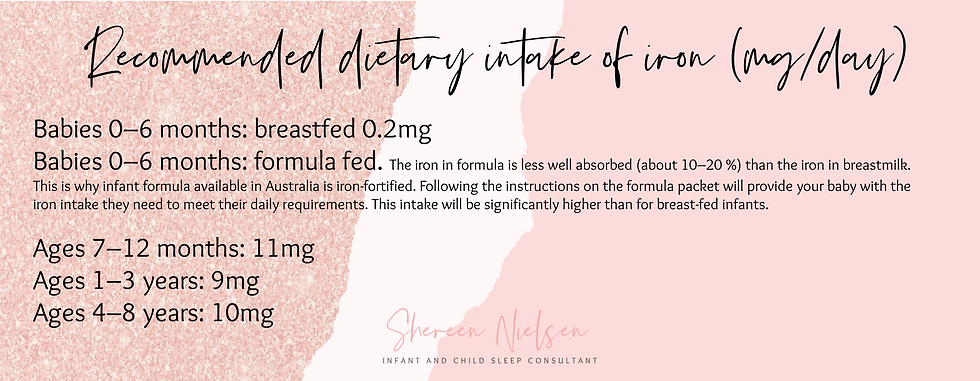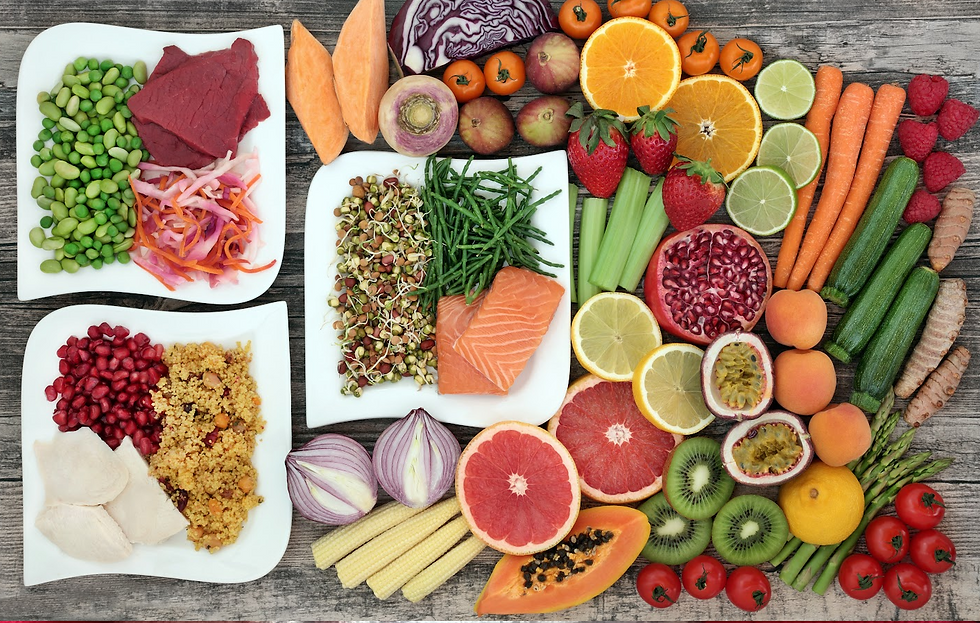Iron - The Super Nutrient
- Shereen Nielsen

- Oct 10, 2022
- 6 min read
You would be surprised at how many of my clients are low in iron. Iron deficiency is quite a prevalent issue in children these days and it is super important that your child has sufficient iron levels to support many vital bodily functions. Iron helps to build energy and focus, supports the immune system, regulates the body temperature but most importantly from my perspective, it assists with great sleep quality.
Why? Well, iron carries oxygen from the lungs to all parts of the body and provides energy. When there are sub-optimal levels of iron, there are not enough red blood cells to transport the oxygen and this means that the body will struggle to transport the oxygen around the body. This will lead to lower levels of oxygenation, which causes low levels of energy and fatigue but not necessarily sleepiness and can affect the ability to fall sleep and stay asleep.
If your child’s body is lacking oxygen transportation, it will lead to poor sleep quality. I often find that children who are low in iron will display this through their sleep presentation. A child who is a chronic early riser and is ready to start their day at the crack of dawn, or wakes through the night and can spend HOURS of time awake, is typically low in iron. This is because the body is tired but it has trouble staying asleep, particularly in the early hours of the morning.

Signs of Iron Deficiency in Children
There are many signs that your child may be low in iron and I have split these into day time presentations and the sleep presentations. Your child may exhibit only one, or several of the below symptoms.
Daytime presentations:
Behavioural problems
Repeat infections
Loss of appetite
Lethargy
Breathlessness
Increased sweating
Strange ‘food’ cravings (pica) like eating dirt
Failure to grow at the expected rate
Sleep presentations:
Chronic early morning waking and not going back to sleep
Waking through the night and trying to go back to sleep
Split nights (aka night parties)
Delayed sleep onset
Restless legs
And if these reasons aren’t enough to encourage you to address their iron, then consider these two studies:
Iron Deficiency Alters Brain Development and Functioning: https://academic.oup.com/jn/article/133/5/1468S/4558529?
Cognitive control inhibition networks in adulthood are impaired by early iron deficiency in infancy
Causes of Iron Deficiency in Children
There are a number of reasons why your child may be iron deficient and it can occur at any age. Some common causes of iron deficiencies in children include:
prematurity and low birth weight
Prolonged breastfeeding when breastmilk replaces solid foods in the diet
Late introduction of solids
high intake of cow’s milk in young children less than 2 years of age
low or no meat intake
vegetarian and vegan eating
poor diet in the second year of life
possible gastrointestinal issues, such as intestinal parasites
Inflammatory diseases/disrupted gut health
mother having low iron during pregnancy and not restoring missing levels before delivery
airway issues/mouth breathing (find out more here: https://www.youtube.com/watch?v=vwXRrdzMc8o)
How to Prevent Iron Deficiency
So, how do you prevent your child from becoming iron deficient?
For all ages and stages, you should ensure that your child:
Has optimal gut health
Nasal breathes
Has unobstructed airways (ie not enlarged tonsils/adenoids)
Gestation, birth to 12 months:
Mother should have an iron-rich diet during pregnancy
Tests should be conducted during pregnancy to test the iron levels
Avoid cow’s milk or other fluids that may displace iron-rich solid foods before 12 months of age
Don’t delay the introduction of solid foods. Start giving your baby pureed foods when they are around 6 months of age
12+ months:
Include lean red meat in your child’s diet at least 3 to 4 times per week.
Offer other iron rich foods such as dried beans, lentils, chickpeas, canned beans, poultry, fish, eggs and small amounts of nuts and nut pastes.
If your family follows a diet free of meat, you should seek advice from a child Naturopath or Dietitian to ensure you are meeting all your child’s dietary needs.
Include vitamin C in your chid’s diet as this helps the body to absorb more iron. Foods rich in vitamin C include oranges, lemons, mandarins, berries, kiwifruit, tomatoes, cabbage, capsicum and broccoli.
Encourage solid foods at mealtimes
Fussy eaters typically have a poor intake or lack of variety in the foods they eat and this can lead to deficiencies.
Ensure that your child does not have a milk/solids imbalance; too much milk can inhibit their ability to absorb iron properly.
How Much Iron?
The Australian Recommended Dietary Intake (RDI) for iron is an average but relevant for most of the population. This amount is different for different age groups and life stages.

Testing the Iron
The one way to know if your child is deficient in iron is to have a blood test. Now, of all people, I know how awful it is to take your child for a blood test, but once we have the iron levels, we know exactly what we are dealing with.
I often refer my clients for a blood test to have their iron levels checked because it can tell me so much about their sleep. Unfortunately, not many health care practitioners are truly aware how disrupted sleep can be from poor iron levels so it can sometimes be a push just to get a referral.
If you are at the point that you want to get a blood test because you suspect low iron in your child, you should request a full iron study from your GP. This will show both stored and available iron levels, which are vital in understanding the iron levels as a whole. This will then assist in creating an adequate plan to restore those missing iron levels!
Treatment for Iron Deficiency
The way in which you can restore your child’s iron levels will depend on what’s causing them to be low in the first place.
First, I always recommend that your child’s gut health is assessed. If you child has poor gut health, then their gut will have trouble absorbing the iron, no matter HOW much iron they are consuming. If your child suffers from any inflammatory diseases, has been on antibiotics, mouth-breathes or experiences sleep disordered breathing (https://www.shereennielsen.com/post/mouth-breathing-vs-nose-breathing), then I recommend you connect with a child specific Naturopath for assessment and management of their gut health.
Once your child has had their blood test and you have the results, you can seek the advice of a health care provider who can help you. I always recommend a child Naturopath as they offer natural advice and supplements which will actually support your plan to increase your child’s iron.
Many over-the-counter pharmaceutical supplements will cause black tarry stools or constipation, and we certainly do not want to solve one problem by creating another.
By seeking the advice and support from a Naturopath, you can be sure that your child’s gut health is optimal, they are having the right amount of supplements required and they are absorbing the iron well. I refer my clients to Ashlee Yates from Nurture Children’s Health - www.nuturechildrenshealth.com

Diet-Led Management
Iron is a diet nutrient, which means we only receive iron from consumption and absorption; our body doesn’t naturally make it. You should ensure that your child is receiving a diet high in both heme and non-heme iron. Heme iron is found in meat, fish and poultry. It is the form of iron that is absorbed most easily by your body. In fact, the body will absorb up to 30% of the heme iron that is consumed. Eating meat will boost the iron levels far more than eating non-heme iron, providing gut health is optimal.
Non-heme iron is found in plant-based foods such as fruits, vegetables and nuts. These foods are still important when’s supporting a nutritious, well-balanced diet, but they are not absorbed as well; only around 2-10% of the non-heme iron that is consumed.
When you eat heme iron with foods higher in non-heme iron, the iron will be more completely absorbed by your body.
Here is a list of some iron-rich foods:

If you would like to chat about your child's sleep presentation, solids intake or anything in between, then please book in for a FREE no obligation 15 minute chat. I am highly trained in exploring the root issues and delving right into the WHY behind your child's sleep habits.
Forever bringing sleep to families,
Shereen xx
My name is Shereen Nielsen and I am a certified infant and child sleep consultant, working with children aged birth to 12 years. I am also a lecturer and mentor for students on their journey towards becoming a Sleep Consultant, through my on-line internationally recognised sleep consultants course.
Phone: +61419820474
Email: hello@shereennielsen.com
Website: www.shereennielsen.com
Facebook: @shereennielsen.sleepconsultant
Instagram: @shereennielsen_sleepconsultant





Comments